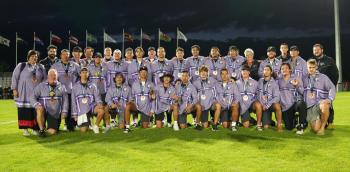Image Caption
Local Journalism Initiative Reporter
Windspeaker.com
Mark Burnam was pleased that his squad was able to capture some hardware at a world tournament.
But Burnam, who served as the head coach for the Haudenosaunee Nationals, can only wonder if his squad would have fared even better than its bronze-medal performance if the world tourney had been held when it was originally scheduled.
Burnam guided the squad to its third-place finish at the world men’s under-21 field lacrosse championships, which concluded this past Saturday, Aug. 20, in Limerick, Ireland.
The event had been postponed two years because of the ongoing COVID-19 pandemic.
Organizers were keen to reward those who had cracked their national team rosters a couple of years ago. As a result, the tourney, which was originally supposed to be an under-19 event, was altered so that it featured under-21 players and included many of those that were eligible for the postponed 2020 championships.
Burnam, who is Mohawk and lives in Syracuse, said he believes the tournament champion American squad benefited the most from the two-year delay.
“I think every one of their players is playing NCAA Division 1 lacrosse,” Burnam said. “And because the tournament was delayed they’ve all played two or three years of Division 1. Those are men now.”
By comparison, the Haudenosaunee club, which included players who live in Canada and the United States, had six athletes who suit up in the collegiate ranks for Division 1 teams.
A total of 23 clubs participated at the world tournament.
The Haudenosaunee squad didn’t have much success early on as it only managed to register one victory in its four round-robin contests.
The team kicked off its tournament with a convincing 14-3 victory against England.
But the Haudenosaunee club was then defeated 13-2 by the U.S.
Burnam’s charges dropped their final two round-robin matches after that, 13-7 against Australia and 14-6 versus Canada.
The Haudenosaunee entry, however, managed to pull out a W in its quarter-final battle, 7-5 against England. With that victory the squad guaranteed itself it would have the opportunity to play in a medal match.
The Haudenosaunee team’s gold-medal aspirations, however, came to an end when it was beaten soundly again by the U.S., by a 10-2 count, in a semi-final game.
Burnam’s club rebounded from that setback to beat Australia 10-6 in the bronze-medal matchup.
The U.S. won the gold by edging Canada 12-10 in the championship final.
“It seemed that we got better and better every single game,” Burnam said.
Haudenosaunee team officials had a challenging task selecting the team’s roster. A total of 125 players from both sides of the border had attended the club’s open tryouts.
But those that were eventually selected to the team’s lineup were not familiar with each other. The fact the squad did not have any exhibition games prior to the tournament did not help matters either.
“The only way they would have known each other would have been if they had played against each other in box lacrosse,” Burnam said of his players.
Burnam said some other squads that participated in the tournament would have trained together for quite some time.
Vince Longboat, a member of Six Nations in Ontario who served as an assistant coach for the Haudenosaunee team, felt the club underperformed somewhat in round-robin play.
“We thought we were going to be 2-2,” he said.
Longboat, however, said the Haudenosaunee side just didn’t play up to its capabilities in its round-robin contest against Australia, since it had been thumped by an 11-goal margin one day earlier by the Americans.
“The boys were just a little off against Australia (in round-robin play),” Longboat said.
Longboat added the Haudenosaunee team switched things up slightly after its round-robin games.
“We made some changes and we started playing better,” he said. “In our quarter-final against England the boys really played well. And that just carried over.”
Despite the fact the U.S. handily beat his club in its next outing, Longboat said team players stepped up their game once again realizing they were still capable of capturing a medal.
“The boys tried to stay positive and recovered well after the semi-final loss,” he said.
Local Journalism Initiative Reporters are supported by a financial contribution made by the Government of Canada.

